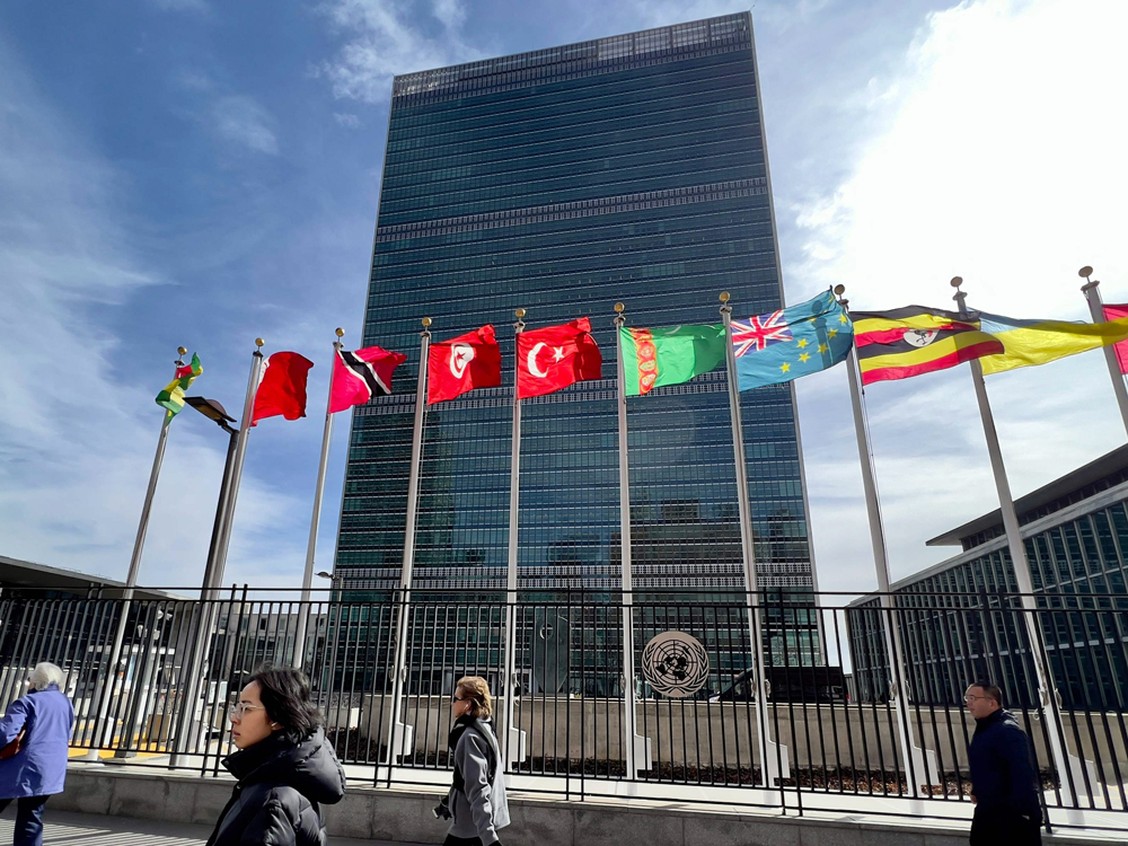Trust in the Veracity and Neutrality of the United Nations?
"It is important for that international body [United Nations] to ensure that in many of the key partners and its deliberations, particularly our neighbour to the south, it retains and fosters trust. Otherwise, its capacity to effect change will risk being affected.""On [the left] end of the [political] spectrum, there seems to be more symmetry between having that positive view of the institution and that it's making a strong effort to achieve those goals.""What was interesting about this [poll] outcome was the incongruence between positive opinion and trust.""They're not as aligned or as symmetrical as they normally are in other types of research in this area."Jack Jedwab, president of ACS (Association for Canadian Studies) and the Metropolis Institute
 |
| The United Nations headquarters in New York. According to the poll, only 38 per cent of Canadians and 30 per cent of Americans trust the UN. Photo by Daniel Slim/AFP via Getty Images |
A new Leger poll was recently released after it surveyed 1,590 Canadians and 1,005 Americans between the dates of February 23 and 26 through an online enquiry panel. According to the poll results, the majority of Canadians and Americans both, have no trust in the United Nations. The Leger survey conducted for the Association for Canadian Studies and the Metropolis Institute took place some four months following the attack by the terrorist Palestinian group Hamas in Israel on October 7, 2023.
The performance of the United Nations and its member bodies since then, has been highly criticized for its response to the attack, as well as for the UN agency UNRWA's cited connections to the Hamas terrorists. The conclusion reached by the survey was that only 38 percent of Canadians and 30 percent of Americans trust the United Nations, an obvious minority in each of the countries. And, as Mr. Jedwab observed, the long-term impact of countries losing trust in the UN becomes seriously concerning in the current atmosphere of the Israel-Hamas and Russia-Ukraine conflicts, among others.
Views in both the U.S. and Canada differ by political affiliation. 53.7 percent of left-identifying respondents and 23.5 percent of right-identifying respondents, with 41 percent of centre-identifying respondents in Canada had trust in the United Nations. For the United States it was 54 percent for left-identifying, 13.2 percent for right-identifying and 38.1 percent for centre-identifying expressing trust.
Accordingly it seemed that the far sides of both the left and right political spectrums have a tendency to indicate the most correlation between a positive view of the UN and the belief that they're making a credible effort to "do the best they can". Still, according to Mr. Jedwab, the results failed to show a relationship between positive feelings toward the UN and trust in it.
The poll took place following Israel's revelation and the presentation of evidence that a dozen employees of the United Nations Relief and Works Agency for Palestine Refugees (UNRWA) actively took part in the October 7 terrorist attacks in southern Israel where a murderous rampage of mass rape, and pride-filled videos taken by the terrorists as they marauded -- sweeping through farming villages, burning families alive in their homes, shooting at people in their cars, waiting at bus stops and finally hostage-taking of children, women and the elderly, leaving 1,200 civilians dead in their wake.
After several attempts to pass a resolution for a ceasefire were vetoed, the UN Security Council proceeded to pass a ceasefire resolution which the United States abstained from. Canadians and Americans were queried about how optimistic they are that peace between Israelis and Palestinians can eventually occur. Canadians were less optimistic (11 percent) than Americans (24 percent), with just under 12 percent of Canadians identifying as being on the left, optimistic compared to 7 percent of those on the right.
Mr. Jedwab felt that Americans could be influenced in their attitudes of how they view the possibility of peace between Israelis and Palestinians, believing their nation could have an impact on such global crises. The majority of both Canadians and Americans, nonetheless, are pessimistic about peace being eventually achievable.
 |
| The United Nations headquarters building, in New York City (Daniel Slim/AFP). |
Labels: Americans, Canadians, Diminishing Trust in the United Nations, Leger Poll

0 Comments:
Post a Comment
<< Home